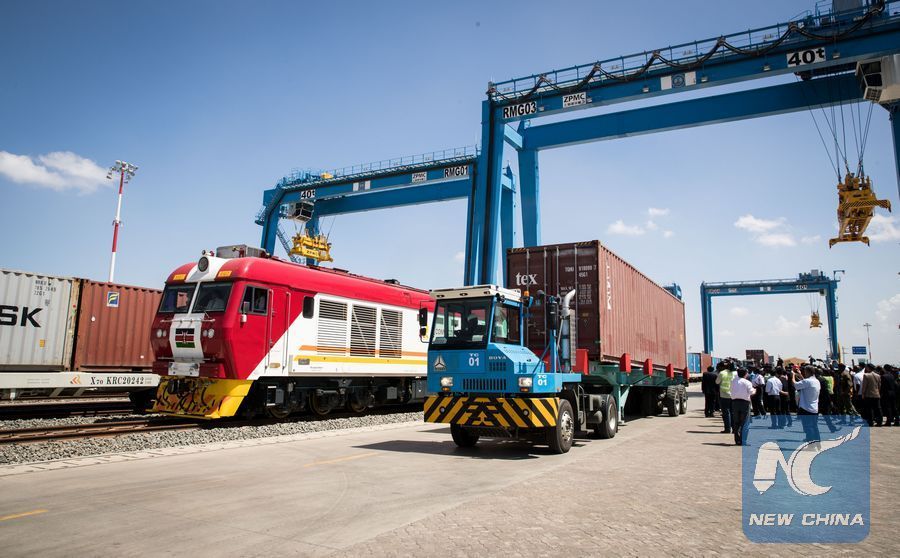
Photo taken on Dec. 16, 2017 shows the upgraded Inland Container Depot (ICD) on the outskirts of Nairobi, Kenya. (Xinhua/Lyu Shuai)
NAIROBI, May 21 (Xinhua) -- China is committed to helping Kenya expand its exports to the Asian nation to boost trade between the two countries, Chinese Ambassador to Kenya Wu Peng has said.
Wu said China is paying greater attention to Kenya's desire to expand its exports, especially agricultural commodities.
"President Uhuru Kenyatta was right to put industrialization as a priority of his Big Four Agenda. Only through industrialization can Kenya reduce imports and promote exports," Wu said in an interview published in Kenya's Daily Nation newspaper early this week.
During a recent visit to China, Kenyatta witnessed an agreement which opens the Chinese market for Kenyan avocados, brightening prospects for other Kenyan horticultural products to enter Chinese market.
"This will make Kenya the first African country to export avocados to China. We are very proactive to make the agreement real. Both sides are working closely to seal a deal on the export of fresh avocado and other products. There's growing need in China for high quality agricultural products and Kenya has prime opportunity. The market and policies are there, now both sides need to engage the right market players so that the deals bear fruits," said Wu.
"As brothers, we understand how important agriculture export is to Kenya. Last year as an outcome of President Kenyatta's visit to our country, China and Kenya signed an agreement on the export of stevia to China, and the phytosanitary memorandum of understanding, which paves the way for access of Kenyan horticultural produce," said the official.
The ambassador said the Chinese government and companies are both contributing in lowering Kenyan imports from China to boost the east African nation's economy.
"We are ready. For instance, a Chinese firm put up a tile-building factory with investment of 8 billion shillings (80 million U.S. dollars) and the output is already meeting 85 percent of Kenyan market needs. Those tiles would be imported but are now made in Kenya and even being exported to neighboring countries. The lesson is that we can't only rely on the government if we want to reduce the trade imbalance but encourage the private sector," he said.
According to him, Kenya-China trade is determined by markets, which means the economic situation and industrial structure of each country influences the imbalance.
"We do not pursue trade surplus with Kenya as a policy. China's total foreign trade in 2018 reached 4.62 trillion dollars, of which China-Kenya trade volume was 5.3 billion dollars. That is about 0.1 percent of our foreign trade volume," he said.
Wu dismissed claims that the east African nation may lose its assets if it defaults on repaying Chinese loans.
"Those assumptions are groundless and I don't think Kenya will default. Sometimes I think we should have common sense. Kenya is a sovereign state. Any asset in your country is protected by international law and should be respected by other countries. These are unnecessary worries," he noted.
He observed that China has offered Kenya several grants that have been used to finance major infrastructure projects, as he dismissed assertions that its commercial loan is expensive.
"The Moi International Sports Centre, Kasarani, was entirely funded by Chinese government grants. In the 1980s, China was a relatively poor country yet it used taxpayer funds to build Kasarani. It was not easy for China. From Kenya's independence, China has implemented more than 100 projects in Kenya under grants and interest-free loans. In last five years, seven construction aid projects and 13 material aid ones have been implemented. Five are in progress. These are grant projects," Wu said.
He added that half of all loans from China to Kenya are on preferential export buyers credit and government concessional loans with very low interest that is just a quarter or even less than the prevailing global financial market rates.
"Any loan agreements between China and Kenya are in line with international practice. None of Kenyan national assets has been mortgaged for the SGR loan and neither would any national asset be seized or controlled by China, even in a situation of default," said Wu.
In the past, Britain, the U.S. and other western nations have expressed concerns about growing Chinese engagement in Africa, springing up fears that the continent was becoming a theatre for super power competition as seen during the Cold War.
"We see support for African peace and development as a common responsibility of the international community. We approach international community cooperation in Africa with an open attitude. We welcome greater input from members of the global community to support Africa's development, but we maintain that such cooperation shall respect Africa's wishes, refrain from interference in domestic affairs and come with no political strings," the ambassador said.

